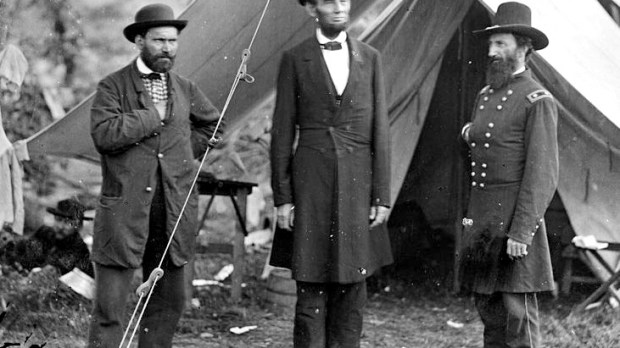In 1864, a teenager named Roswell McIntyre was drafted into the New York Cavalry during the Civil War. He ended up being sent into battle with very little training. He was young. And he was terrified. His fear got the best of him. He ended up running away from his battalion. Not long after, he was caught and tried for desertion. He was found guilty, court-martialed.
For his crime, he was sentenced to be shot.
Roswell’s mother appealed to President Lincoln. She pleaded that he was young, and deserved a second chance.
Lincoln thought long and hard about it—and took counsel from his generals, who told him that pardoning the boy would be devastating for morale and set a bad example.
But he came to a very different conclusion.
“I have observed,” he said, “that it never does a boy much good to shoot him.”
He sat down and wrote out by hand the following letter:
“This letter will certify that Roswell McIntyre is to be readmitted into the New York Cavalry. When he serves out his required enlistment, he will be freed of any charges of desertion.” That letter, with Lincoln’s signature, is now on display in the Library of Congress. Beside it there is a note, which reads, “This letter was taken from the body of Roswell McIntyre, who died at the battle of Little Five Forks, Virginia.” Roswell was killed in battle just a few weeks after he received Lincoln’s letter. He didn’t die a traitor or a deserter. Roswell McIntyre, by the mercy of President Lincoln, gave his life in service to his country.
While scholars debate whether or not Lincoln was a believing Christian, there’s no question he knew scripture intimately, including the story of The Prodigal Son.
And he took its lesson of mercy to heart.
Lincoln’s second inaugural address spoke of having “malice toward none, charity for all.” When someone later asked him how he planned to treat the southerners who had broken away from the country, the president replied: “I will treat them as if they had never been away.”
He could have been speaking as the father of the prodigal son.
When we encounter this story, we usually approach it from the point of view of the son. But maybe we have it backwards. The great biblical commentator William Barclay has said this parable should really be called “The Loving Father.” A few years ago, the Christian artist Charlie Mackesy did a series of paintings and sculptures about this parable and called it “The Running Father.” Ultimately it is a story of a father’s love—a lesson in how far our heavenly Father is willing to go for us. He runs to us, even when we are far away, when he sees we want to come home.
But if we consider this from the father’s point of view, we may find ourselves confronting this question: how many of us could do what he did?
It’s something to consider during this Year of Mercy. The motto for this Year of Mercy, like this parable, comes from the gospel of Luke: “Be merciful, just as your Father is merciful.” It’s part of the same passage in which Jesus commands us to love our enemies.
What Christ is telling us is that mercy is not just something that God bestows on us.
It is a gift we are called to bestow on one another.
That means:
Forgive those who have hurt us or insulted us or done us wrong. Honor and respect those who are contrite.
It means: Run to meet those who wounded, and ashamed, and hurt, and who want to come home. Open your arms to someone who wants to start over.
It means: Know the value of the second chance. Spare the Roswell McIntyres of the world. Believe in redemption and conversion and hope.
“Be merciful as your father is merciful.” This is Christ’s call to us, his lesson to us, his challenge to us during these last weeks of Lent. And it couldn’t come at a better time.
We live in a merciless age. We live in a world consumed by cynicism, fear and anger. We are a culture more comfortable mocking and bullying. It happens in the schoolyard, in social media, on cable television. Anyone who watched the debate Thursday night saw it in full force. What Lincoln once called “the better angels of our nature” are harder and harder to find.
But among the many lessons in this gospel is one we all need to hear:
Do not give in to this unforgiving, merciless age.
What God offers to us we can offer to others. “Be merciful like the Father is merciful”—our father in heaven, and the father in this parable.
It begins with reconciliation—with one another and, most especially, with God. Paul put it so simply in the letter to the Corinthians we just heard: “Be reconciled with God.” Go to confession. Heal the wounds of sin that are keeping us from God. Begin the journey home. God wants to welcome us back. His arms are waiting for us.
But we cannot be reconciled with God without also being reconciled to one another. “We are ambassadors for Christ,” Paul writes, “as if God were appealing through us.”
Do people see that? Do we reflect Christ to those who meet us? Are we merciful like the father?
The Eucharist we are about to receive reminds us of the greatest gift God gave the world—his son.
Christ, as Pope Francis said recently, is the very face of the father’s mercy.
He came to us to give us all what God willed for the world: a second chance.
The question for us during these last weeks of Lent in this Year of Mercy: Are we willing to take that second chance?
And in our own lives, are we willing to give it?

